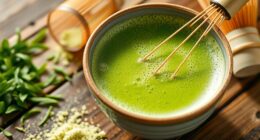Are you thinking about incorporating turmeric tea into your daily regimen but unsure if it’s beneficial or harmful for you? Turmeric has been a staple in traditional medicine and cuisine for generations, and turmeric tea is a favored method of enjoying this powerful spice.
While turmeric is known for its potential health benefits, there are also some concerns about its safety and possible side effects. In this article, we’ll explore the origins and history of turmeric tea, its nutritional value, the potential health benefits and risks, scientific evidence supporting its use, and how to incorporate it into your diet.
By the end of this article, you’ll have a better understanding of whether turmeric tea is a good or bad choice for your health.
Turmeric tea is made by brewing turmeric root powder or grated turmeric in hot water, and it’s often consumed for its anti-inflammatory, antioxidant, and immune-boosting properties. It’s a popular drink in India and other parts of Asia, and it’s becoming increasingly popular in the Western world as well.
However, there are some concerns about the safety of turmeric tea, particularly for certain groups of people. So, let’s dive into the research and explore whether turmeric tea is a good or bad choice for your health.
Key Takeaways
- Turmeric tea is generally considered beneficial for health due to its anti-inflammatory, antioxidant, and immune-boosting properties.
- However, it may interfere with certain medications, particularly blood thinners, and can increase the risk of bleeding, particularly if taking blood thinners or have a bleeding disorder.
- Consuming large amounts of turmeric tea may cause gastrointestinal issues and allergic reactions in some individuals.
- It is crucial to speak with a healthcare provider before adding turmeric tea to the daily routine and recommended dosages are no more than 1-2 teaspoons of turmeric powder per day.
The Origins and History of Turmeric Tea
You’re probably wondering where turmeric tea even comes from, and why it’s been around for so long. Turmeric is a spice that has been used for centuries in traditional Ayurvedic medicine and cooking in India and other parts of Southeast Asia. The use of turmeric as a medicinal herb dates back 4000 years ago.
It was used to treat a range of ailments, including digestive issues, inflammation, and skin conditions. Turmeric tea, also known as golden milk, has cultural significance in India and other parts of Southeast Asia. It is traditionally prepared by simmering grated turmeric root in milk, water, or coconut milk, along with other spices like cinnamon, ginger, and black pepper.
Variations of turmeric tea also include adding honey, lemon, or even green tea. Now that you know the origins and cultural significance of turmeric tea, let’s talk about its nutritional value.
The Nutritional Value of Turmeric
Did you know that incorporating a teaspoon of ground turmeric in your daily diet can provide up to 26% of your daily manganese needs, which is essential for bone health and metabolism? Turmeric is also a good source of iron, fiber, and vitamin B6. It is low in calories and high in antioxidants, making it a great addition to any diet.
Here is a table that shows the nutritional value of turmeric per 1 teaspoon serving:
| Nutrient | Amount |
|---|---|
| Calories | 9 |
| Carbohydrates | 1.7g |
| Fiber | 0.4g |
| Protein | 0.3g |
| Fat | 0.2g |
Turmeric can be consumed in various forms such as supplements, cooking with turmeric powder, or making turmeric tea. In the subsequent section, we will explore the potential health benefits of turmeric tea.
The Potential Health Benefits of Turmeric Tea
Get ready to experience the amazing potential health benefits of sipping on a warm, comforting cup of turmeric-infused tea. Turmeric, a spice commonly used in Indian cuisine, has been found to have anti-inflammatory properties.
Drinking turmeric tea regularly may help reduce inflammation in the body, which is linked to a variety of chronic diseases such as heart disease, cancer, and diabetes. Additionally, studies suggest that turmeric may have a positive impact on mental health. One study found that curcumin, the active ingredient in turmeric, had a similar effect as antidepressant medication in treating symptoms of depression.
Apart from its anti-inflammatory and mental health benefits, turmeric tea may also have other potential health benefits. Research has shown that turmeric may help lower cholesterol levels and improve brain function. It may also have antioxidant properties, which can help protect the body from damage caused by free radicals.
With all these potential benefits, it’s no wonder that turmeric tea has gained popularity as a health drink. However, as with any food or drink, there are also potential risks associated with consuming turmeric tea. Let’s take a closer look at these risks in the next section.
The Potential Risks of Turmeric Tea
You should be aware that turmeric tea may interfere with certain medications you’re taking.
Turmeric can also increase your risk of bleeding, particularly if you’re taking blood-thinners or have a bleeding disorder.
Additionally, consuming large amounts of turmeric tea may cause gastrointestinal issues and allergic reactions in some individuals.
It’s important to speak with your healthcare provider before adding turmeric tea to your daily routine, especially if you have any underlying health conditions or are taking medication.
Interference with Medications
If you’re taking medication, it’s important to be aware that turmeric tea may interfere with the absorption or effectiveness of certain drugs. Here are some key discussion ideas on the topic of drug interactions and turmeric tea:
- Turmeric tea can interfere with the effectiveness of blood thinning medications, such as warfarin, by increasing the risk of bleeding.
- Turmeric tea may also affect the absorption of drugs like aspirin, ibuprofen, and naproxen, which could potentially reduce their effectiveness.
- Some medications, such as diabetes drugs, may be affected by turmeric tea’s ability to lower blood sugar levels. This could lead to dangerously low blood sugar levels if not monitored closely.
- It’s important to talk to your doctor before consuming turmeric tea if you’re taking any medications, to ensure that it’s safe for you to do so.
With this in mind, it’s crucial to be aware of the risks associated with turmeric tea, particularly in terms of drug interactions. The next subtopic focuses on the risk of bleeding, which is another important consideration when consuming turmeric tea.
Risk of Bleeding
Be cautious when consuming turmeric tea as it may increase the risk of bleeding when combined with certain medications. Turmeric contains compounds called curcuminoids, which can interfere with blood clotting and increase the risk of bleeding. This is particularly concerning for those taking blood thinners such as warfarin or aspirin, as it can lead to excessive bleeding.
Potential interactions with turmeric tea and medications such as blood thinners can be avoided by consulting with your healthcare provider. They can provide dosage recommendations and advise if it is safe for you to consume turmeric tea. It is important to note that turmeric has many health benefits, but it is crucial to understand the potential risks and interactions with medications. In the next section, we will discuss the potential gastrointestinal issues that can arise from consuming turmeric tea.
Gastrointestinal Issues
Experiencing digestive discomfort can be a potential side effect of regularly consuming turmeric, adding to the importance of understanding the risks and benefits of incorporating it into your diet. If you’re experiencing gastrointestinal issues from drinking turmeric tea, there are potential remedies and dietary modifications that can help alleviate the discomfort. Here are some tips to keep in mind:
- Avoid drinking turmeric tea on an empty stomach to reduce the risk of digestive distress.
- Consider starting with a small amount of turmeric and gradually increasing the dosage to help your body adjust.
- Try adding ginger or peppermint to your turmeric tea, as both of these herbs can help soothe the digestive tract.
- If you continue to experience discomfort, consider talking to your healthcare provider about other potential remedies or adjusting your diet to reduce inflammation.
Understanding the potential side effects of turmeric tea can help you make informed decisions about incorporating it into your diet. If you’re experiencing gastrointestinal issues, there are dietary modifications and remedies that can help alleviate the discomfort. However, it’s important to note that allergic reactions are also a potential risk, which we’ll discuss in the subsequent section.
Allergic Reactions
You may have a serious allergic reaction to consuming turmeric, which can be a scary and potentially life-threatening experience. Allergic reaction risks are relatively low, but it’s still important to be aware of common symptoms such as hives, swelling of the face or tongue, difficulty breathing or swallowing, and anaphylaxis.
If you experience any of these symptoms after consuming turmeric, seek medical attention immediately. If you’ve experienced an allergic reaction to turmeric or are concerned about the potential risk, there are potential alternative remedies that you can consider. For example, ginger is a close relative of turmeric and may provide similar health benefits without the risk of allergic reaction.
Additionally, managing allergic reactions may involve avoiding turmeric in all forms, including supplements and topical applications, as well as carrying emergency medication such as an epinephrine auto-injector. Despite the potential risks, turmeric has been studied extensively for its health benefits, and the next section will explore the scientific evidence supporting its use.
Scientific Evidence Supporting the Health Benefits of Turmeric
Turmeric’s potential health benefits have been extensively studied by scientists. One of the most well-known benefits is its anti-inflammatory properties. Curcumin, the active ingredient in turmeric, has been shown to reduce inflammation in the body, which can help alleviate symptoms of conditions such as arthritis, inflammatory bowel disease, and even certain types of cancer.
Additionally, studies have also suggested that turmeric may have a potential role in preventing chronic diseases such as Alzheimer’s and heart disease. While the evidence supporting turmeric’s health benefits is promising, it’s important to note that the studies conducted have mostly been done using high doses of curcumin supplements rather than turmeric tea.
However, incorporating turmeric into your diet through tea or other forms may still have some benefits. In the next section, we’ll discuss recommended dosages for turmeric tea.
Recommended Dosages for Turmeric Tea
To get the most out of your turmeric tea, it’s important to know the recommended dosages. While there is no exact standard for turmeric tea dosage, most experts recommend consuming no more than 1-2 teaspoons of turmeric powder per day. This is equivalent to roughly 400-600 milligrams of curcumin, which is the active ingredient in turmeric that provides its many health benefits.
Consuming too much turmeric can lead to digestive issues, such as nausea, bloating, and diarrhea. It can also interact with certain medications, such as blood thinners, so it’s important to consult with a healthcare professional before consuming turmeric tea regularly.
Now that you know the recommended dosages, let’s move on to how to prepare turmeric tea.
How to Prepare Turmeric Tea
Get ready to cozy up with a warm and fragrant cup of turmeric tea by following these simple preparation steps. First, gather the necessary ingredients: 1-2 teaspoons of turmeric powder, 2 cups of water, a pinch of black pepper, and your choice of sweetener (optional).
Then, follow these easy steps:
- Bring water to a boil in a small saucepan.
- Reduce heat and add turmeric powder and black pepper.
- Let the mixture simmer for about 10 minutes.
- Strain the tea into a mug, add sweetener if desired, and enjoy!
Turmeric tea benefits are numerous, including its anti-inflammatory and antioxidant properties. Plus, there are various turmeric tea recipes out there to suit your taste preferences.
Now that you know how to prepare turmeric tea, you can easily incorporate it into your daily routine for a healthy boost.
How to Incorporate Turmeric Tea into Your Diet
You can easily make turmeric tea a part of your daily diet by incorporating different variations of the drink. For example, you can add ginger, cinnamon, or black pepper to enhance the flavor and increase the potential health benefits. You can also use different types of milk, such as almond or coconut milk, to create a creamy and delicious beverage.
The best times to drink turmeric tea are in the morning, before breakfast, or in the evening, before bed. This is because turmeric can help boost your metabolism and digestion, as well as promote relaxation and better sleep. However, it’s important to note that if you have a history of gallbladder problems, kidney stones, or bleeding disorders, you should consult with your doctor before consuming turmeric tea.
In the next section, we’ll discuss who should avoid drinking turmeric tea in more detail.
Who Should Avoid Drinking Turmeric Tea
If you have a history of gallbladder problems, kidney stones, or bleeding disorders, it’s important to consult with your doctor before indulging in this delicious beverage. While turmeric tea is generally safe for most people, it may not be suitable for individuals with certain medical conditions.
For instance, turmeric can stimulate bile production, which can worsen symptoms in people with gallbladder problems. Additionally, turmeric is high in oxalates, which can contribute to the formation of kidney stones in susceptible individuals.
Possible discussion ideas: Turmeric tea and pregnancy, Turmeric tea and liver disease. Pregnant women should talk to their doctor before drinking turmeric tea, as there is limited research on its safety during pregnancy. Some studies suggest that high doses of turmeric may increase the risk of miscarriage and preterm birth. Similarly, individuals with liver disease should exercise caution when drinking turmeric tea, as it can interfere with the liver’s ability to metabolize certain medications.
As with any dietary supplement, it’s important to speak with your healthcare provider before incorporating turmeric tea into your routine. As you can see, while turmeric tea may offer numerous health benefits, it’s not without its potential risks and side effects.
In the next section, we will explore the final verdict on whether or not turmeric tea is bad for you.
Final Verdict on Whether or Not Turmeric Tea is Bad for You
After weighing the potential risks and benefits, it’s clear that incorporating turmeric tea into your diet in moderation can be a healthy and flavorful choice. Here are some reasons why:
-
Turmeric tea may aid in weight loss: Studies have shown that the active ingredient in turmeric, called curcumin, may help boost metabolism and promote weight loss. Additionally, turmeric tea can help curb cravings and keep you feeling full for longer periods of time.
-
Turmeric tea may improve skin health: Curcumin has anti-inflammatory and antioxidant properties that can help reduce inflammation and protect against skin damage caused by free radicals. Drinking turmeric tea may help improve your skin’s overall appearance and promote a healthy glow.
-
Turmeric tea is a natural pain reliever: Curcumin has been shown to have pain-relieving properties, making it a natural alternative to over-the-counter pain medication.
-
Turmeric tea can boost your immune system: Curcumin has been shown to have immune-boosting properties, making it a great choice for those looking to improve their overall health and wellbeing. Incorporating turmeric tea into your diet can help keep you healthy and prevent illness.
Overall, incorporating turmeric tea into your diet can be a great choice for those looking to improve their health and wellbeing. Not only is it tasty and flavorful, but it also has a variety of potential health benefits. As always, it’s important to consume turmeric tea in moderation and consult with a healthcare professional if you have any concerns.
Frequently Asked Questions
Can turmeric tea be used to treat specific health conditions?
Looking to improve your health? Turmeric tea benefits include reducing inflammation and aiding digestion. Try adding a dash of black pepper to increase absorption. Check out turmeric tea recipes for a tasty way to enjoy these benefits.
Can turmeric tea be consumed by pregnant or breastfeeding women?
If you’re pregnant or breastfeeding, you should be cautious about consuming turmeric tea. Pregnancy concerns include possible uterine contractions, while breastfeeding limitations involve the transfer of turmeric compounds to the baby. Consult with your healthcare provider first.
Is it safe to consume turmeric tea in large quantities?
Turmeric tea provides numerous health benefits and can be consumed in moderate amounts. However, excessive intake may cause side effects. Stick to recommended dosages and consult your healthcare provider if you have any concerns.
Does turmeric tea have any negative side effects?
Turmeric tea can potentially cause digestive discomfort and skin irritation in some individuals. However, this varies from person to person and is not a common side effect. It is generally considered safe to consume in moderation.
Can turmeric tea interact with any medications or supplements?
Be cautious when consuming turmeric tea with certain medications or supplements. Turmeric may interact with blood thinners, diabetes medications, and supplements that affect blood sugar or blood pressure. Consult a healthcare professional before adding turmeric tea to your routine.
Conclusion
Congratulations! You’ve made it to the end of the article and are probably wondering if turmeric tea is bad for you. Based on the evidence presented, it seems that turmeric tea can offer numerous health benefits. However, as with any food or drink, there are potential risks to be aware of.
Let’s be honest, no one wants to hear that something they love to consume may have negative consequences. But rather than labeling turmeric tea as ‘bad,’ it’s important to weigh the potential risks against the potential benefits and make an informed decision for yourself.
Remember, moderation is key and it’s always a good idea to consult with a healthcare professional before making any significant dietary changes. So go ahead and enjoy that cup of turmeric tea, but do so with awareness and mindfulness.










